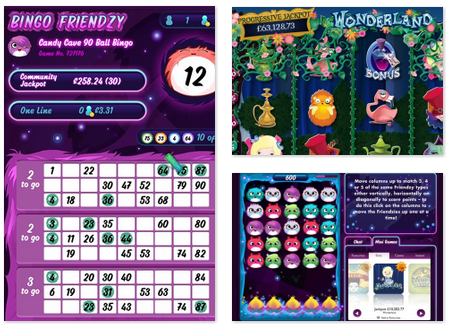For the last three quarters, Facebook has been struggling to move the needle on its payments business, but today a new game has launched that could provide a clue to how that could change that in the future: the social network has, for the first time, allowed a gaming app on its platform that allows users to play with real money — not Facebook Credits. Called Bingo & Slots Friendzy, the app is an extension of the Jackpotjoy.com franchise from Gamesys, and will be available in the UK only, and only to users over the age of 18.
As with many other apps on its platform, Facebook is not directly involved in the creation and operation of the app. Rather, it has permitted Gamesys to offer the app, and that is a sign it is testing the waters for how it might allow for more games like this in the future. Financial terms of the deal, Facebook tells us, are commercially confidential, so it is not clear whether proceeds from the game will follow the 30/70 revenue split that applies to games using Facebook Credits.
“Facebook is a place that allows people to connect and share,” a spokesperson told TechCrunch in a statement. “Real money gaming is a popular and well-regulated activity in the UK and we are allowing a partner to offer their games to adult users on the Facebook platform in a safe and controlled manner.”
Apart from its own Jackpotjoy offering, Gamesys also makes other Facebook social games Sun Bingo and Heart Bingo.
The move to offer gambling services is a sensitive area — in some countries like the U.S. the rules against this are very strict indeed — and here it looks like Gamesys is taking all sorts of measures to try to make sure that only those allowed to use the app will be using the app:
Before being permitted to play, users have to verify their identity in their accounts, proving that they are over 18 and located in the UK. Also, Facebook has an age-gating technology that will mean that any activity related to the games will not appear in timelines of users who are under 18 years of age. “Young people are far more likely to see an ad for Bingo on the TV or in a betting shop window as they walk to school than they are on Facebook,” a source told TechCrunch. Ditto users from outside the UK — who also will not see any ads.
So why the UK first for this? Not only is the UK a good test market for Facebook (it’s European but also English-speaking), it has a pretty strong culture for gambling, with off-track betting shops littering many a high street around the country for anyone over 18 to come in and place bets on horses, football games, and whether it will rain during the Royal Wedding.
“Gambling is very popular and well regulated in the UK…for millions of bingo users it’s already a social experience [so] it makes sense [for us] to offer that as well,” Julien Codorniou, Facebook’s head of gaming for Europe, Middle East and Africa, told The Financial Times (via Telegraph).
The move comes at the same time that Mark Pincus, CEO of Zynga, has said that his company is planning to introduce social gambling in 2013. Zynga is a close partner of Facebook’s in the world of social games, so this could mean Zynga offering games here as well. (VegasVille, anyone?) For now, Zynga would have to only offer such services outside of the U.S., which has strict laws against online gambling.
Facebook has had limited success with its Facebook Credits service. In its last quarterly earnings, the company reported payments revenues of $192 million, but that is barely higher than the $186 million of the quarter prior, or the $188 million before that. In that context it is not too surprising to see it exploring more avenues — akin to how Facebook is looking for new formats in advertising to bolster that side of the business.






























Comment